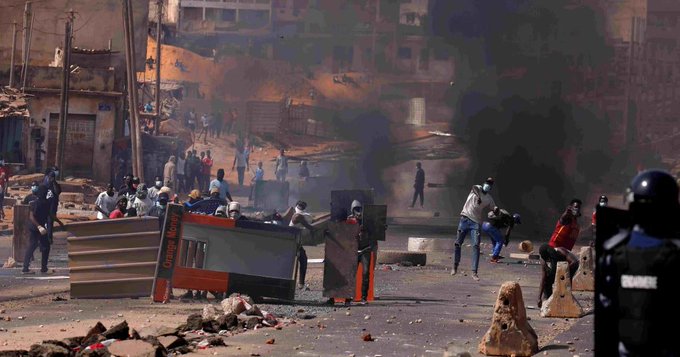Senegal experts called on the government on Monday to instill calm after days of the deadliest violence in years and concerns it could have lasting consequences.
Days of clashes between security forces and supporters of opposition leader Ousmane Sonko have killed at least 16 people and injured hundreds of others. Police have arrested 500 people, some of whom used Molotov cocktails and weapons.
“(There’s) the threat of chaos. The threat of civil war,” Alioune Tine, founder of Afrikajom Center, a West African think tank, told The Associated Press in an interview Monday in the capital, Dakar. “We have never ever lived this situation in Senegal … We cannot go fighting among ourselves and we have to stop now, to make peace now, to be united now.”
The clashes first broke out last Thursday, after Sonko was convicted of corrupting youth but acquitted on charges of raping a woman who worked at a massage parlor and making death threats against her. Sonko, who didn’t attend his trial in Dakar, was sentenced to two years in prison.
While Senegal, a country of around 17 million people, has experienced upheaval before, rights groups and analysts say the current clashes are the worst political crisis the nation has seen since 1988, when a general strike and electoral protest shook the power of the then president, Amnesty International researcher Ousmane Diallo said.
At the heart of the unrest are fears that President Macky Sall will run for a third term. The constitution limits presidents to two five-year terms. But Sall argues that a constitutional reform adopted in 2016 allows him to reset the clock and seek another term.
“My massive worry is that we are only on the premises of the violence cycle in Senegal as the (possible) announcement of a third mandate run by Macky Sall could trigger a massive popular uprising and violence Senegal has never seen so far,” said Guillaume Soto-Mayor, researcher at the Middle East Institute.
Senegal experts called on the government on Monday to instill calm after days of the deadliest violence in years and concerns it could have lasting consequences.
Days of clashes between security forces and supporters of opposition leader Ousmane Sonko have killed at least 16 people and injured hundreds of others. Police have arrested 500 people, some of whom used Molotov cocktails and weapons.
“(There’s) the threat of chaos. The threat of civil war,” Alioune Tine, founder of Afrikajom Center, a West African think tank, told The Associated Press in an interview Monday in the capital, Dakar. “We have never ever lived this situation in Senegal … We cannot go fighting among ourselves and we have to stop now, to make peace now, to be united now.”
The clashes first broke out last Thursday, after Sonko was convicted of corrupting youth but acquitted on charges of raping a woman who worked at a massage parlor and making death threats against her. Sonko, who didn’t attend his trial in Dakar, was sentenced to two years in prison.
While Senegal, a country of around 17 million people, has experienced upheaval before, rights groups and analysts say the current clashes are the worst political crisis the nation has seen since 1988, when a general strike and electoral protest shook the power of the then president, Amnesty International researcher Ousmane Diallo said.
At the heart of the unrest are fears that President Macky Sall will run for a third term. The constitution limits presidents to two five-year terms. But Sall argues that a constitutional reform adopted in 2016 allows him to reset the clock and seek another term.
“My massive worry is that we are only on the premises of the violence cycle in Senegal as the (possible) announcement of a third mandate run by Macky Sall could trigger a massive popular uprising and violence Senegal has never seen so far,” said Guillaume Soto-Mayor, researcher at the Middle East Institute.
Some extremely young people are dying daily, and Senegal and its democratic system are possibly on the brink of collapse, he said.
Others Senegalese experts warn that if the violence continues it might not only destabilize the country but could be an opening for jihadi violence, which has already wracked much of the region, including in neighboring Mali and Burkina Faso.
Some families have lost relatives who weren’t involved in the protests, but have suffered the consequences of the unrest.
Elhaji Cisse was walking home after praying at the mosque Friday evening when he was shot in the shoulder by a bullet. The 26-year-old was rushed to hospital, but died minutes later. He was about to study abroad in Canada, said his family.
“Elhaji was not a demonstrator. He was a good patriot. He was interested in everything that was happening in the country … He went to pray, but when he came back, they threw tear gas. He stepped aside to avoid the grenades. Then the gendarmes were there and they shot,” said Djimbala Ba, his brother. The AP cannot independently verify how Cisse was killed, however demonstrators have reported the use of live bullets.
AP

